
Michael Klonsky (born 1943) is an American educator, author, [1] and political activist. He is known for his work with the Students for a Democratic Society, the New Communist Movement, and, later, the small schools movement.

Michael Klonsky (born 1943) is an American educator, author, [1] and political activist. He is known for his work with the Students for a Democratic Society, the New Communist Movement, and, later, the small schools movement.
Klonsky's father, Robert Klonsky, a World War II veteran who fought as a volunteer against the Nationalists during the Spanish Civil War, had been arrested and convicted of "conspiring to advocate Marxist views" in violation of the Smith Act during the McCarthy period. [2] The Supreme Court later overturned the case.
In the late 1960s Klonsky became the national secretary of the Students for a Democratic Society, [3] which he joined as a student at San Fernando Valley State College (now California State University, Northridge). [4] He was one of five S.D.S. members arrested on May 12, 1969, when "anonymous false reports of fire and a shooting" sent police and firefighters to the S.D.S. offices in Chicago. [3]
In the 1970s he became a leader of the New Communist Movement which broke with the older Communist Party USA and its allegiance to the Soviet Union. He headed the Communist Party (Marxist–Leninist), [5] in which role he was one of the first U.S. political activists to visit the People's Republic of China. [5] [6] Klonsky later became critical of Marxist dogma but stayed active in civil rights, anti-war and educational reform politics.
Klonsky became one of the leaders of the modern small schools movement. His academic work focused on small school size as a solution to the problems of inner city schools; his early research [7] on issues of school size and its impact on student achievement, school violence, and dropout rates, helped pave the way towards the development of thousands of new small and charter schools across the country. By 1996, he was the director of the Small Schools Workshop at the University of Illinois, Chicago, [8] and in 1999, he was named by president Bill Clinton to the Academic Advisory Council of the National Campaign Against Youth Violence, where he advocated small schools as a mechanism for violence reduction. [9] Klonsky is now a retired professor of education after teaching at several universities, including UIC [10] and the Fischler School of Education at Nova Southeastern University. [11]
A communist party is a political party that seeks to realize the socio-economic goals of communism. The term "communist party" was popularized by the title of The Manifesto of the Communist Party (1848) by Karl Marx and Friedrich Engels. As a vanguard party, the communist party guides the political education and development of the working class (proletariat). As a ruling party, the communist party exercises power through the dictatorship of the proletariat. Vladimir Lenin developed the idea of the communist party as the revolutionary vanguard, when the socialist movement in Imperial Russia was divided into ideologically opposed factions, the Bolshevik faction and the Menshevik faction. To be politically effective, Lenin proposed a small vanguard party managed with democratic centralism which allowed the centralized command of a disciplined cadre of professional revolutionaries. Once a policy was agreed upon, realizing political goals required every Bolshevik's total commitment to the agreed-upon policy.

Maoism, officially called Mao Zedong Thought by the Chinese Communist Party (CCP), is a variety of Marxism–Leninism that Mao Zedong developed to realize a socialist revolution in the agricultural, pre-industrial society of the Republic of China and later the People's Republic of China. The philosophical difference between Maoism and traditional Marxism–Leninism is that a united front of progressive forces in class society would lead the revolutionary vanguard in pre-industrial societies rather than communist revolutionaries alone. This theory, in which revolutionary praxis is primary and ideological orthodoxy is secondary, represents urban Marxism–Leninism adapted to pre-industrial China. Later theoreticians expanded on the idea that Mao had adapted Marxism–Leninism to Chinese conditions, arguing that he had in fact updated it fundamentally and that Maoism could be applied universally throughout the world. This ideology is often referred to as Marxism–Leninism–Maoism to distinguish it from the original ideas of Mao.
The New Communist movement (NCM) was a diverse left-wing political movement during the 1970s and 1980s. The NCM were a movement of the New Left that represented a diverse grouping of Marxist–Leninists and Maoists inspired by Cuban, Chinese, and Vietnamese revolutions. This movement emphasized opposition to racism and sexism, solidarity with oppressed peoples of the third-world, and the establishment of socialism by popular revolution. The movement, according to historian and NCM activist Max Elbaum, had an estimated 10,000 cadre members at its peak influence.
The history of the socialist movement in the United States spans a variety of tendencies, including anarchists, communists, democratic socialists, Marxists, Marxist–Leninists, Trotskyists and utopian socialists. It began with utopian communities in the early 19th century such as the Shakers, the activist visionary Josiah Warren and intentional communities inspired by Charles Fourier. Labor activists, usually Jewish, German, or Finnish immigrants, founded the Socialist Labor Party of America in 1877. The Socialist Party of America was established in 1901. By that time, anarchism also rose to prominence around the country. Socialists of different tendencies were involved in early American labor organizations and struggles. These reached a high point in the Haymarket massacre in Chicago, which founded the International Workers' Day as the main labour holiday around the world, Labor Day and making the eight-hour day a worldwide objective by workers organizations and socialist parties worldwide.

Robert Klonsky was a member of the Abraham Lincoln Brigade, which fought on the side of the Spanish Republicans in the Spanish Civil War.
The New American Movement (NAM) was an American New Left multi-tendency socialist and feminist political organization established in 1971.
John Gregory Jacobs was an American student and anti-war activist in the 1960s and early 1970s. He was a leader in both Students for a Democratic Society and the Weatherman group, and an advocate of the use of violent force to overthrow the government of the United States. A fugitive since 1970, he died of melanoma in 1997.
The American Left can refer to multiple concepts. It is sometimes used as a shorthand for groups aligned with the Democratic Party. At other times, it refers to groups that have sought egalitarian changes in the economic, political, and cultural institutions of the United States. Various subgroups with a national scope are active. Liberals and progressives believe that equality can be accommodated into existing capitalist structures, but they differ in their criticism of capitalism and on the extent of reform and the welfare state. Anarchists, communists, and socialists with international imperatives are also present within this macro-movement. Many communes and egalitarian communities have existed in the United States as a sub-category of the broader intentional community movement, some of which were based on utopian socialist ideals. The left has been involved in both the Democratic and Republican parties at different times, having originated in the Democratic-Republican Party as opposed to the Federalist Party.

Tom David Kahn was an American social democrat known for his leadership in several organizations. He was an activist and influential strategist in the Civil Rights Movement. He was a senior adviser and leader in the U.S. labor movement.
The Communist Party (Marxist–Leninist) was a Maoist political party in the United States.

In the United States, the Revolutionary Youth Movement (RYM) is the section of Students for a Democratic Society (SDS) that opposed the Worker Student Alliance of the Progressive Labor Party (PLP). Most of the national leadership of SDS joined the RYM in order to oppose PLP's party line and what they alleged to be its attempted takeover of the SDS leadership structure, particularly at the 1969 SDS convention in Chicago.
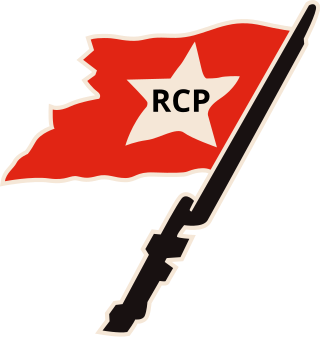
The Revolutionary Communist Party, USA is a new communist party in the United States founded in 1975 and led by its chairman, Bob Avakian. The party organizes for a revolution to overthrow the system of capitalism and replace it with a socialist state, with the final aim of world communism. The RCP is frequently described as a cult around Avakian.
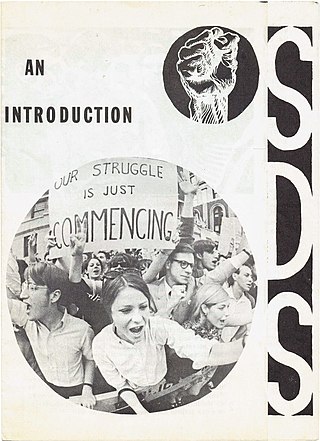
Students for a Democratic Society (SDS) was a national student activist organization in the United States during the 1960s and was one of the principal representations of the New Left. Disdaining permanent leaders, hierarchical relationships and parliamentary procedure, the founders conceived of the organization as a broad exercise in "participatory democracy". From its launch in 1960 it grew rapidly in the course of the tumultuous decade with over 300 campus chapters and 30,000 supporters recorded nationwide by its last national convention in 1969. The organization splintered at that convention amidst rivalry between factions seeking to impose national leadership and direction, and disputing "revolutionary" positions on, among other issues, the Vietnam War and Black Power.
The Revolutionary Communist Party of Britain (Marxist–Leninist) (RCPB-ML) is a small British communist political party, previously named the Communist Party of England (Marxist-Leninist) on formation in 1972 until being reorganised in 1979 after rejecting Maoism and aligning with Albania. The party's thinking is based on the politics of Hardial Bains, who travelled the world founding orthodox (anti-revisionist) communist parties.
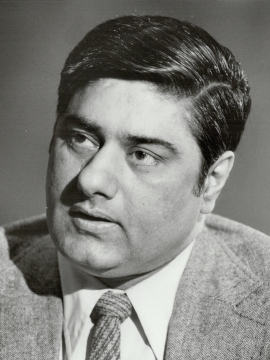
Hardial Bains was an Indo-Canadian microbiology lecturer, but was primarily known as the founder of a series of left-wing movements and parties foremost of which was the Communist Party of Canada (Marxist–Leninist). Presenting himself as staunchly anti-revisionist and pro-Stalinist, until his death, Bains acted as the spokesperson and ideological leader of the CPC (ML) — known in elections as the Marxist–Leninist Party of Canada. During his lifetime, Bains' outlook swung from supporting the Soviet Union under Joseph Stalin, to Mao Zedong's China, then later to Enver Hoxha's Albania. Shortly before he died, and abandoning his previous sharp criticisms of the country, Bains turned to Fidel Castro's Cuba for inspiration. Spending most of his life in Canada, Bains was also politically active in England, Ireland, United States and India.
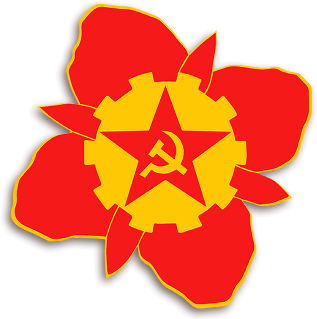
The Communist Party of Canada (Marxist–Leninist) is a federal political party in Canada. It was founded in 1970 by Hardial Bains, a staunch Stalinist and anti-revisionist. The CPC(M-L) has been registered with Elections Canada as the Marxist–Leninist Party of Canada (MLPC) since 1974, as the party is prohibited from using the name "Communist Party of Canada" in Canadian elections to avoid confusion among voters. The party is not an offshoot of the Communist Party of Canada; its early membership came from student-led organizations active in the 1960s. After a period of alignment with Maoism and China, the CPC(M-L) pursued a Hoxhaist, pro-Albanian line until the early 1990s. At present, the party directs most of its public support to Cuba and North Korea.
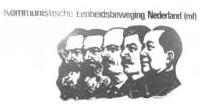
Communist Unity Movement of the Netherlands (marxist-leninist) (Dutch: Kommunistiese Eenheidsbeweging Nederland (marxisties-leninisties); KEN (ml)) was a communist organization in the Netherlands founded in 1964.
The New Left was a broad political movement that emerged from the counterculture of the 1960s and continued through the 1970s. It consisted of activists in the Western world who campaigned for a broad range of social issues such as feminism, gay rights, drug policy reforms, Statism, Neo-Marxism and the rejection of traditional family values, social order, and gender roles. The New Left differs from the traditional left in that it tended to acknowledge the struggle for various forms of social justice, whereas previous movements prioritized explicitly economic goals. However, many have used the term "New Left" to describe an evolution, continuation, and revitalization of traditional leftist goals.
The history of left-wing politics in the United States consists of a broad range of individuals and groups that have sought fundamental egalitarian changes. Left-wing activists in the United States have been credited with advancing social change on issues such as labor and civil rights as well as providing critiques of capitalism.
The 1969 Students for a Democratic Society National Convention held in June of that year in Chicago, Illinois was the final convention held by the Students for a Democratic Society (SDS). The gathering, which took place over June 18–22, was one of four conventions that officers and members of SDS attended each year. Taking place at the Chicago Coliseum, the convention was the site of chaos and tension, with members breaking into factions, each vying for control of the organization. Prior to this convention, one of the factions, the Revolutionary Youth Movement (RYM), soon to be renamed the Weathermen, wrote a manifesto regarding the ways and means by which to take SDS in the years to come. The creation of the Weathermen, from RYM, was essentially the main reason for the functioning, and later the disintegration, of SDS. Leading members of the college-based organization wanted to push its boundaries in order to create real revolution and change in America. The SDS National Convention of June 1969 was the culmination of all disagreement within its membership. The result of the convention was a disoriented and gutted organization, complete in only its name.
Former President Richard M. Nixon saw him in February 1976 when Mr. Hua had just become Acting Prime Minister. The only other Americans to talk with him have been two Chinese‐American scientists and Michael Klonsky, head of the Communist Party of the U.S.A. (MarxistLeninist), which is a small pro‐Chinese rival of the pro‐Soviet Communist Party U.S.A. headed by Gus Hall.
Michael Klonsky, director of the Small Schools Network, was named a visiting professor at Nova Southeastern University's Fischler School of Education and Human Services in North Miami Beach, Fla. He will maintain his position at the Small Schools Network.